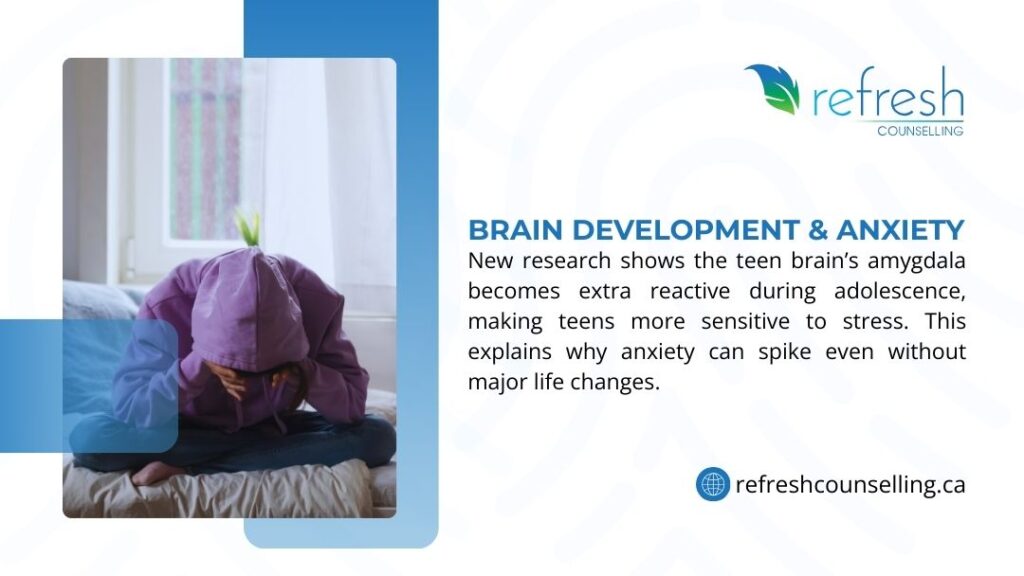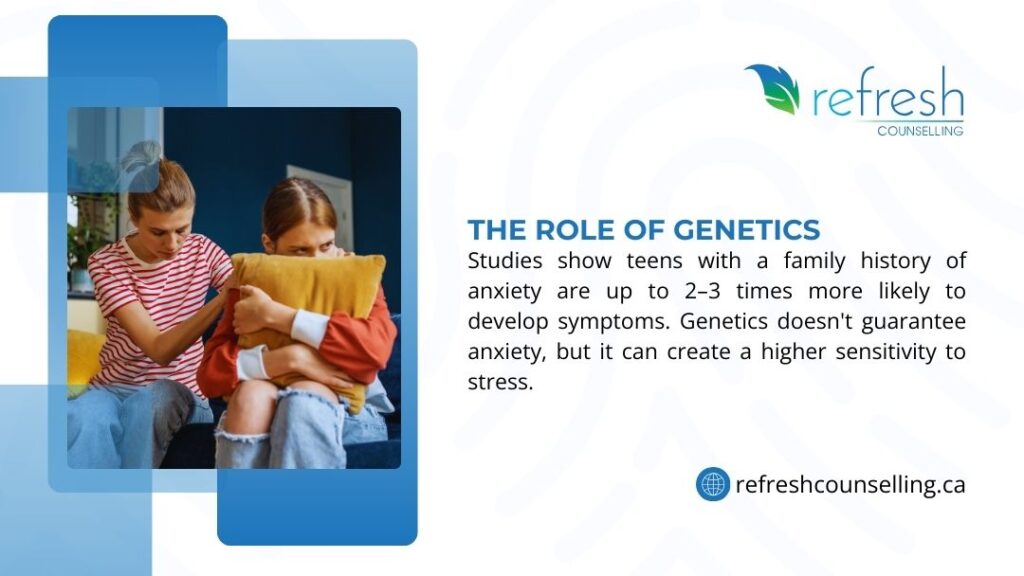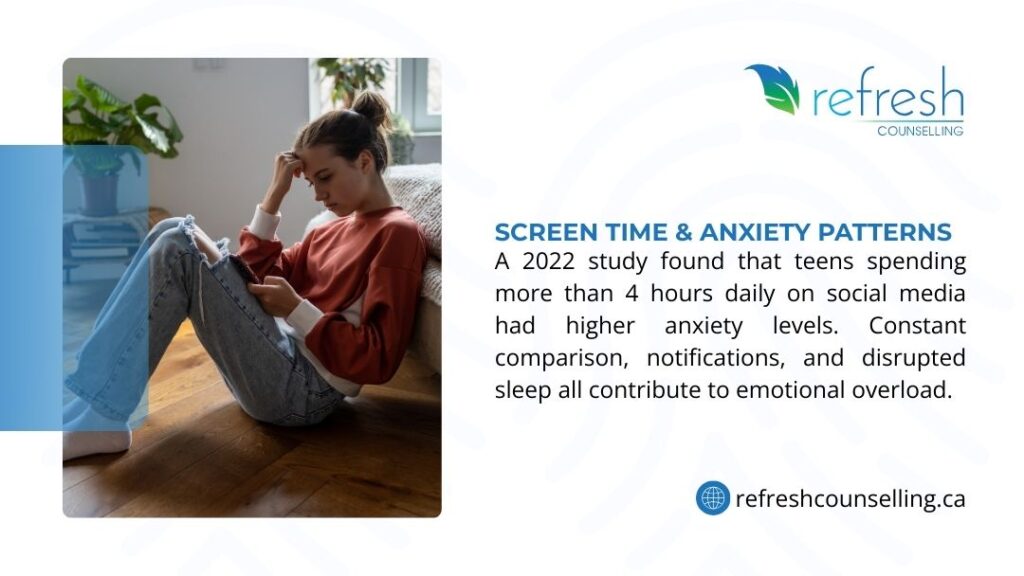From 2011 to 2018, diagnosed anxiety disorders among Canadian teens jumped from 6% to nearly 13%. That means 1 in 8 teenagers now faces anxiety that affects their daily life.
This article helps parents recognize teen anxiety early and respond in ways that actually support them. We’ll show you the physical, emotional, and behavioral signs that separate normal teenage stress from a condition that needs professional support.
You’ll also find practical strategies based on evidence from hundreds of families we’ve worked with at Refresh Counselling.
The Growing Reality of Teen Anxiety in Canada
Parents often ask us whether their teen’s worry is “normal” or something more serious. The answer lies in how anxiety affects daily function:
- Does your teen avoid school, friends, or activities they used to enjoy?
- Do physical complaints interfere with their life?
These patterns signal the difference between typical stress and teen anxiety that needs attention.
About 3% of Canadian children or youth experience an anxiety disorder, but many more struggle with symptoms that don’t yet meet diagnostic thresholds. Early recognition prevents these symptoms from becoming more severe conditions.
Age Group | Diagnosed Anxiety Rate | Key Insight |
10-14 years | 4.1% | Anxiety starts younger than most parents expect |
15-19 years | 5.3% | Rates increase as teens face more complex stressors |
Overall trend | Doubled 2011-2018 | Teen anxiety has grown significantly in recent years |
What Teen Anxiety Actually Looks Like
Anxiety in teenagers rarely announces itself clearly. Most teens often don’t admit that they feel anxious but instead, teen anxiety shows up through changes parents can observe if they know what to watch for.
Warning signs are behavioral changes that can be observed by parents, other family members, teachers, and peers. Symptoms, on the other hand, are a teen’s inner experiences. Both matter for accurate identification.
We’ve noticed in our practice that parents often mistake anxiety symptoms for typical teenage moodiness. The key difference is intensity, duration, and impact on daily life.
Normal teenage worry comes and goes but teen anxiety persists for weeks or even months and interferes with school, relationships, or health.
- Physical Signs Parents Often Miss
Many of the physical complaints that can occur with an anxiety disorder mimic average teen complaints, which tend to increase as they get older.
Watch for patterns rather than isolated incidents. One headache means nothing. Weekly headaches with no medical cause signal something deeper.
| Physical Symptom | What It Looks Like | When to Worry |
| Headaches | Frequent complaints, especially before school or social events | Multiple times per week for several weeks |
| Stomach problems | Nausea, cramping, digestive issues with no medical cause | Recurring pattern tied to stressors |
| Muscle tension | Tight shoulders, clenched jaw, general body aches | Persistent physical discomfort |
| Sleep disruption | Trouble falling asleep, frequent waking, exhaustion | Affects school performance or mood |
| Fatigue | Constantly tired despite adequate rest | Interferes with activities they used to enjoy |
| Rapid heartbeat | Racing heart, especially in non-physical situations | Frequent enough to cause worry or avoidance |
Physical symptoms of anxiety in teens happen because stress hormones trigger real bodily responses. Your teen isn’t making it up. Their body genuinely reacts to perceived threats, even when the danger exists only in their mind.
We, as mental health providers, recommend that teens aged 13 to 18 need to get eight to ten hours of sleep to support optimal health.
- Emotional Symptoms of Anxiety
Emotional symptoms of anxiety in teenagers often hide behind irritability or withdrawal. Teens rarely announce “I feel overwhelmed.” Instead, they snap at siblings, slam doors, or shut down completely.
Here’s what emotional symptoms actually look like in daily life:
| Emotional Sign | What Parents See | What Teens Experience |
| Constant worry | Repeated questions about safety, outcomes, or approval | Feeling unable to control racing thoughts |
| Irritability | Snapping at family, overreacting to minor issues | Frustration from feeling overwhelmed |
| Perfectionism | Obsessing over grades, redoing homework repeatedly | Fear of failure or disappointing others |
| Low confidence | Avoiding challenges, negative self-talk | Belief they can’t handle normal situations |
- Behavioral Signs of Anxiety
Behavioral signs of anxiety show up in what teens do (or avoid). These observable changes often bring parents to our office because they can’t ignore the impact on family life.
- School Avoidance: When teens consistently ask to stay home, arrive late, or skip classes, anxiety may drive the behavior. Performance dip in school, poor report cards, poor testing results often follow as anxiety makes concentration nearly impossible.
If you notice patterns like my teenager has no friends, anxiety might prevent them from developing social connections.
- Social Withdrawal: Avoiding people, places, and things that trigger anxious feelings isolates teens from support systems they need.
- Risky Behaviors: Some anxious teens turn to substance or alcohol abuse and other risky behaviors as coping mechanisms. What looks like rebellion may actually be desperate attempts to numb uncomfortable feelings.
Reassurance Seeking Anxious teens constantly ask parents whether everything will be okay. They need repeated confirmation about decisions, outcomes, or their performance. While occasional reassurance is normal, excessive dependence on validation signals anxiety.

Common Types of Teen Anxiety
There are several types of anxiety, and each has distinct features, though many teens experience symptoms from multiple categories.
| Anxiety Type | Main Features | Common Triggers |
| Generalized Anxiety (GAD) | Excessive worry about many aspects of life | School, family, health, future |
| Social Anxiety | Intense fear of judgment or embarrassment | Social situations, public speaking, eating in front of others |
| Panic Disorder | Sudden episodes of intense fear with physical symptoms | Often unpredictable; fear of having another attack |
| School Refusal | Extreme distress about attending school | Academic pressure, social fears, separation from home |
| Separation Anxiety | Excessive worry about being apart from parents | Sleepovers, school trips, time away from home |
Anxiety vs Normal Teen Stress: Key Differences
Every teen experiences stress. Not every teen has an anxiety disorder. Here’s how to tell the difference:
| Normal Stress | Teen Anxiety |
| Worry resolves when stressor passes | Worry persists even after event ends |
| Doesn’t significantly interfere with daily life | Prevents participation in normal activities |
| Teen can usually be reassured | Reassurance provides only temporary relief |
| Physical symptoms are mild and temporary | Physical symptoms are intense or chronic |
| Mood returns to baseline within days | Low mood or irritability lasts weeks |
A good idea is to reach out to a professional if your teen’s anxiety has been showing up for more than a couple of weeks, getting in the way of school, friends, or daily life.
Getting support early can make a big difference and help your teen feel better sooner.
When It Might Be Time to Seek Extra Support for Teen Anxiety
Here are some signs that counselling could be helpful:
Red Flags That Need Immediate Attention
- Thoughts of self-harm or suicide
- Complete school refusal lasting more than a few days
- Panic attacks that occur frequently
- Substance use to cope with anxiety
- Inability to function in daily life
- Physical symptoms severe enough to interfere with eating or sleeping
Signs Professional Help Would Benefit Your Teen
- Anxiety symptoms persist for more than two weeks
- Home strategies don’t improve the situation
- School performance declines significantly
- Social relationships suffer
- Your teen expresses feeling unable to cope
- Family relationships become strained
At Refresh Counselling, we see teen anxiety improve dramatically when addressed early. Our team specializes in evidence-based approaches that reduce symptoms and build resilience. If you’re concerned about your teenager, teen counselling services provide the support they need.

Practical Ways Parents Can Help Right Now
While professional treatment produces the best outcomes for significant teen anxiety, parents can take immediate steps that make a real difference.
- Validate Feelings Without Validating Fears
Tell your teen “I can see you’re really worried about this” rather than “There’s nothing to worry about.” Validation means acknowledging their feelings as real and important. It doesn’t mean agreeing with anxious thoughts.
Avoid saying things like “Just relax” or “You’re fine.” These responses, though well-intended, make teens feel misunderstood. Instead, try “I know this feels overwhelming. Let’s figure out what might help.”
- Create a Calm Environment
Anxious teens need predictable routines and calm home atmospheres. Chaos increases anxiety. Establish consistent meal times, bedtimes, and family check-ins.
Limit family conflict when possible. If you notice patterns of anger in your teen, our article on why is my teen so angry explores the connection between anger and underlying anxiety.
- Teach Practical Coping Skills
Simple techniques help anxious teens regain control in moments of high stress:
- Deep breathing (4 counts in, 7 counts hold, 8 counts out)
- Progressive muscle relaxation
- Grounding exercises that focus on present moment
- Physical activity to discharge stress hormones
These tools work best when practiced regularly, not just during crisis moments. Set aside 10 minutes daily for your teen to practice coping skills. For more detailed strategies, see our guide on how to deal with anxiety.
- Know When to Step Back
This sounds counterintuitive, but sometimes parental involvement makes anxiety worse. If you solve every problem or allow extensive avoidance, you prevent your teen from building confidence.
Help your teen face appropriate challenges rather than removing all sources of stress. The goal is support, not rescue.
| Helpful Response | Less Helpful Response |
| “I see you’re anxious. What’s one small step you could take?” | “Don’t worry, I’ll handle it for you” |
| “That sounds really hard. What’s worked for you before?” | “Just stop thinking about it” |
| “Let’s practice that breathing exercise we learned” | “Calm down right now” |
Get Professional Support for Your Teen
At Refresh Counselling, we have an experienced team of mental health providers who understand teen anxiety from a clinical and personal perspective.
You as a parent can receive guidance on how to respond effectively in order to reduce symptoms and strengthen family relationships.
We offer flexible online counselling for families who prefer virtual sessions, along with in-person appointments at our Calgary location.Contact Refresh Counselling today to schedule an assessment. Our intake process is straightforward and designed to make parents just as you feel comfortable from the first interaction.

Common Questions Regarding Teen Anxiety
Which signs can indicate teen anxiety most commonly?
If a teen is anxious, the likely signs are unceasing worry, stomach aches and other physical complaints, and sometimes the teen gets irritable or withdraws from school and social life.
Will teen anxiety eventually disappear without any intervention?
A little anxiety goes away over time, but the majority of the young ones feel relieved quicker and are in convalescence for a longer period of time if they have mentoring support or if they know the right coping skills.
What is the distinction between anxiety and stress in adolescents?
Stress is typically relieved as soon as the situation changes, while anxiety persists, is felt to be heavier, and becomes a hindrance to the normal course of life.
What is the duration of the treatment process for anxiety in teens?
Therapy for teens is usually taking a couple of months before the baby steps of their real progress are noticed, but the timing is dependent on the young person’s needs.
